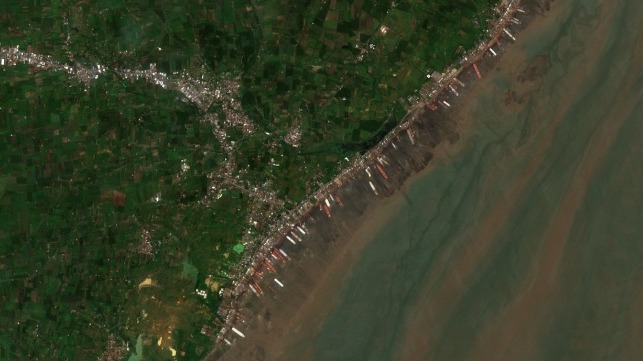MSC Criticized for South Asian Demolition Sales

An environmental and human rights campaign group has asked MSC to change its ship recycling policy. The NGO Shipbreaking Platform, a global coalition of advocacy groups focused on shipbreaking practices, has highlighted MSC’s continued practice of selling old tonnage for eventual demolition on tidal beaches in South Asia. These transactions are typically brokered by an intermediary, or cash buyer, giving the shipowner an arms-length transaction with top-price scrapyards. If MSC restricted its cash buyer to resell to a scrapper in Turkey - the main EU-compliant alternative region - it would greatly reduce the demolition sale price, and therefore reduce MSC's revenue.
In the last two years, MSC has scrapped 27 vessels, and most have ended up in the possession of scrapyards in Alang, India. Some of the recycled vessels include MSC Floriana and MSC Giovanna, which left from Spanish and Turkish waters (respectively) to India. According to the coalition, this is a violation of European and international law prohibiting the export of hazardous waste from OECD to non-OECD countries.
No yards in India, Pakistan or Bangladesh have been certified for safety and environmental compliance under the EU Ship Recycling Regulation (SRR). Thus, European shipowners are prohibited from directly exporting vessels for scrapping in South Asia, where the overwhelming majority of demolition sales occur.
Alang is home to about 135 shipbreaking yards with an overall capacity of 4.5 million light displacement tonnage (LDT). As a hub for cost-efficient shipbreaking, Alang has been found to have breaches of international labor rights and safety standards, though many of these yards have worked to meet shipping-industry expectations.
As the world’s largest ocean carrier, commanding a 20 percent share of the global operated container fleet, the NGO Shipbreaking Platform argues that MSC should be at the forefront of promoting safe ship recycling practices. The carrier is already implementing some positive contributions to curb illegal waste trade. Earlier this year, MSC UK launched the Waste Shipment Intelligence Service in collaboration with the UK Environmental Agency, aiming to stop transboundary shipment of illegal waste onboard its vessels.
“Whilst we applaud MSC for its commitment to assist in combating illegal waste trade, it is ironic that MSC is continuing to dump its toxic waste on beaches in South Asia. We urge MSC to reform its ship recycling policy to ensure that its end-of-life vessels are disposed of in line with the highest safety and environmental standards,” said Ingvild Jenssen, Executive Director, NGO Shipbreaking Platform.
MSC maintains that it audits scrapping yards to ensure compliance with the Hong Kong Convention (HKC) on safe recycling of ships, though the HKC does not in itself satisfy EU compliance requirements.
A new legal precedent could be in the offing, with Germany recently charging ship owners for illegally exporting vessels to South Asia for scrapping. In March next year, two shipowners will appear before the Rendsburg District Court for violating German and European waste laws. Analysts argue that this case could set a precedent, leading to additional cases of similar violations – and potentially force EU owners to accept less revenue from their demolition sales.
No comments:
Post a Comment